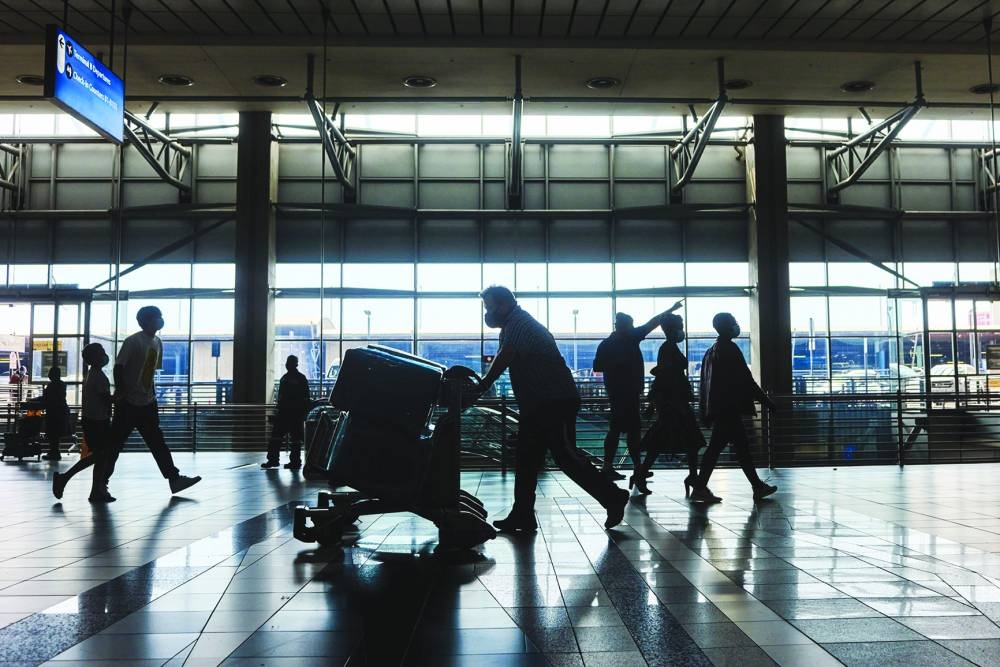Business
Strong aviation potential driver of Africa's economic, social development
Aviation Page - Beyond the Tarmac

A passenger wheels a luggage trolley inside the departures terminal at OR Tambo International Airport in Johannesburg. Africa’s aviation industry holds significant potential for growth and development, given the continent's rising population, economic prospects, increasing urbanisation and the need for improved connectivity.
Africa’s aviation industry holds significant potential for growth and development, given the continent's rising population, economic prospects, increasing urbanisation and the need for improved connectivity.
Africa has one of the fastest growing populations in the world. A burgeoning middle class with rising disposable incomes is expected to increase demand for air travel.
Undoubtedly, many African countries are experiencing rapid economic growth, which boosts both business and leisure travel. This growth will potentially lead to increased investments in the continent’s aviation infrastructure.
Africa is home to numerous tourist attractions, including wildlife reserves, historical sites, and beautiful landscapes. Improved air connectivity, therefore, will enhance tourism, which is a vital sector for many African economies.
However, the continent also faces several challenges that need to be addressed to fully realise these opportunities.
Many African countries lack adequate aviation infrastructure, including modern airports, efficient air traffic control systems, and maintenance facilities.
Safety and security are also critical concerns in the African aviation industry. Ensuring compliance with international safety standards and improving security measures are essential for gaining passenger trust.
Although Africa’s airlines are expected to earn a collective net profit in 2024 for the second year in a row, the International Air Transport Association (IATA) says the expected profit falls well below the global average.
According to the global trade body of airlines, African airlines are set to achieve $100mn net post-tax profit this year, which translates into profit per passenger of only 90 US cents per passenger – well below the $6.14 of the sector globally.
Profit margins also sit lower than the global net profit margin of 3.1%, at 0.6% of revenue.
“The fact that Africa’s airlines are expected to earn a collective net profit in 2024 for the second year in a row is a hard-won result for the sector after the turbulence of Covid-19 pandemic,” IATA said in a recent report.
Strong passenger growth is a boon across the region though, as revenue passenger kilometres (RPK) growth is forecasted at 8.5%. Load factor is also expected to reach 61.9%, slightly ahead of the 59.8% breakeven load factor for African Airlines.
“The demand to travel is there. To meet it, the African airline sector needs to overcome many challenges, not least of which are infrastructure deficiencies, high costs, onerous taxation, and the failure to broadly implement a continent-wide multilateral traffic rights regime,” noted Kamil Alawadhi, IATA’s regional vice president (Africa and the Middle East).
“The challenges facing African aviation are significant, but they are not insurmountable. IATA’s Focus Africa initiative is by no means a panacea, but it does lay out a framework to build a stronger aviation sector that will provide even better support to economic growth and social development.”
Focus Africa aims to address key challenges and opportunities within the continent's aviation sector, emphasising six priority areas: Safety, infrastructure, connectivity, finance and distribution, sustainability, and future skills.
On safety, Africa as a continent had no jet hull losses for the second year in a row and the 31 IOSA registered carriers continue to outperform non-IOSA registered carriers both on the continent and globally.
Regarding connectivity, the Single African Air Transport Market (SAATM) seeks to liberalise civil aviation by removing limits on traffic rights for African airlines. It also helps the continent drive economic growth, but few states have implemented it.
Non-compliance by African governments to bilateral air service agreements (BASAs) is another obstacle to achieving seamless regional connectivity and growth and IATA says that to develop economy-boosting intra-Africa connectivity “Africa’s governments must back SAATM with actions.”
The amount of blocked funds in African countries in June this year stood at $880mn, just over 52% of the $1.68bn in blocked funds globally.
IATA says this is an improvement after Nigeria cleared 98% of the total funds blocked, which sat at $831mn.
The association has called on African governments to take advantage of its strong aviation sector as it seeks to revive economic and social development benefits across the continent.
The African aviation industry has immense potential for growth, driven by economic expansion, increasing demand for air travel, and opportunities for tourism and trade.
However, addressing the challenges of infrastructure, regulatory frameworks, operating costs, safety, connectivity, skilled workforce, and financing is essential to unlock this potential.
By tackling these issues, the African aviation sector can become a key driver of economic development and integration on the continent.
Pratap John is Business Editor at Gulf Times. Twitter handle: @PratapJohn

